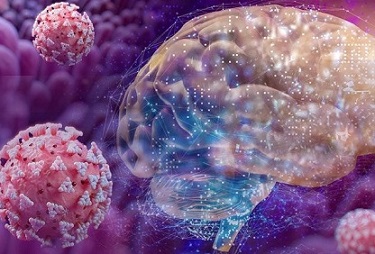COVID-19 News: Tulane University Study Finds That SARS-CoV-2 Aggravates Conditions In Those With Vascular Dementia
Nikhil Prasad Fact checked by:Thailand Medical News Team Jan 01, 2024 2 years, 1 month, 5 days, 3 hours, 55 minutes ago
COVID-19 News: In the ongoing battle against the COVID-19 pandemic, emerging research continues to shed light on the multifaceted impacts of the virus on various health conditions. A recent study covered in this
COVID-19 News report, conducted by Tulane University School of Medicine in New Orleans, USA, has unveiled a concerning link between COVID-19 and Vascular Dementia (VaD), the second leading cause of dementia after Alzheimer's disease (AD). This study highlights the intricate association between preexisting VaD and worsened outcomes post-COVID-19 infection, emphasizing the need for a deeper understanding of the underlying mechanisms.

Considering that more than more than 55 million people globally have dementia and that between 10 to 20% of those are actually cases involving vascular dementia, the study findings are relevant for healthcare professionals and caregivers.
https://www.who.int/news-room/fact-sheets/detail/dementia
https://www.alzheimersresearchuk.org/dementia-information/types-of-dementia/vascular-dementia/
https://www.alz.org/alzheimers-dementia/what-is-dementia/types-of-dementia/vascular-dementia
Background
The study delves into the connection between VaD and COVID-19 morbidity and mortality, revealing that individuals with preexisting vascular dementia are more susceptible to COVID-19 and experience exacerbated outcomes. The research suggests that the vascular pathology characteristic of VaD, including blood-brain barrier (BBB) disruption, plays a direct role in this association. Previous findings have indicated that the SARS-CoV-2 virus, responsible for COVID-19, binds to the vascular integrin α5β1 receptor. Inhibition of this receptor with the clinically-validated peptide ATN-161 has shown promise in improving acute SARS-CoV-2 infection and reducing SARS-CoV-2-mediated vascular disruption.
Methodology
To further explore the hypothesis that experimental VaD worsens COVID-19-associated neuroinflammation and exacerbates subsequent neurovascular damage, the study employed a mouse model. Ten-week-old wild-type male mice underwent bilateral carotid artery stenosis (BCAS) surgery to mimic the effects of preexisting VaD. Subsequently, the mice were infected with mouse-adapted SARS-CoV-2 or subjected to a mock infection. The mice's body weight was monitored, and their brains were analyzed for immunohistochemical and mRNA expression related to neuroinflammation and immune response.
Results
The results of the study demonstrated a significant reduction in body weight in mice with both BCAS and SARS-CoV-2 infection compared to the BCAS with mock infection group. Immunohistochemical analysis revealed a substantial increase in the α5 integrin signal in the cortex. F
urthermore, SARS-CoV-2 infection following BCAS surgery exacerbated brain and vascular inflammation, glial activation (microglia and astrocytes), and increased levels of proinflammatory cytokine IL-1β. Additionally, white matter damage, indicated by myelin basic protein (MBP) immunofluorescence, was worsened in mice with both VaD and SARS-CoV-2 infection.
Conclusion
The study's findings strongly suggest that SARS-CoV-2 aggravates VaD-associated morbidity, leading to elevated white matter damage, glial activation, and neuroinflammation. The increased expression of integrin α5 further underscores its potential role in this aggravated condition. The researchers propose that targeting integrin α5β1 could serve as a therapeutic strategy for improving both acute SARS-CoV-2 infection and mitigating VaD post-COVID morbidity and cognitive decline.
In conclusion, this Tulane University study contributes valuable insights into the complex interplay between COVID-19 and vascular dementia. The identification of integrin α5β1 as a potential therapeutic target opens avenues for further research and the development of targeted interventions to alleviate the dual burden of COVID-19 and VaD. As the global scientific community strives to combat the ongoing pandemic, such studies pave the way for a more comprehensive understanding of the virus's impact on diverse health conditions.
The study findings were published in the peer reviewed Alzheimer's & Dementia Journal.
https://alz-journals.onlinelibrary.wiley.com/doi/10.1002/alz.080080
For the latest
COVID-19 News, keep on logging to Thailand Medical News.
